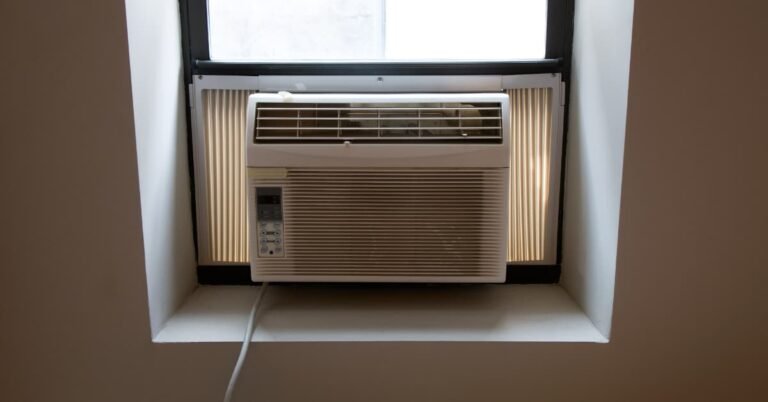Why Air Conditioner Smells Like Flowers? How To Fix
Air conditioners sometimes emit a pleasant floral scent, which can be attributed to several factors. One potential cause is the presence of mold or mildew in the AC system, which can grow in damp environments. Another possibility is the accumulation of dust and debris on the air filters, which may release a musty odor.
Some air conditioners have built-in air fresheners or deodorizers that emit fragrances like flowers. To mitigate odors, it is essential to clean or replace air filters regularly, ensure proper ventilation, and consider using odor-absorbing products.
By addressing these factors, you can enjoy fresh and breathable air from your air conditioner.
Why Does Your Air Conditioner Smell Like Flowers?
There can be several reasons why your air conditioner may exude a floral scent. Some of the common causes include mold growth, blocked drain pans, contaminated air filters, and malfunctioning components within the system.
While these pleasant smells can also signal air conditioning unit problems. So, it is important to address them promptly and take preventive measures to avoid them in the future.

1. Air Freshener
Is the delightful floral scent coming from your air conditioner? While it may seem enchanting at first, you might wonder why your AC smells like flowers.
One possible explanation is the use of air fresheners. These scented products are often used to mask unpleasant odors and infuse a space with a pleasant fragrance.
If air fresheners are used near your air conditioning unit for a long time, the scent can permeate the system, resulting in an unexpected floral aroma.
How To Fix?
If the air freshener scent is overpowering or you no longer want the floral fragrance, you can take steps to fix it.
1. Identify the source: Locate the air freshener and ensure it is not in direct contact with the air conditioner or its filter.
2. Disable or remove the air freshener: Switch off the air freshener or remove it completely from the vicinity of the air conditioning unit to prevent further scent dispersion.
3. Clean the air filter: Remove the air filter carefully and clean it thoroughly with a mild detergent and warm water. Allow it to dry completely before reinserting it.
4. Ventilate the room: Open windows and doors to allow fresh air to circulate and help dissipate the residual fragrance from the air conditioner.
5. Consider natural alternatives: If you still desire a pleasant scent in the room, opt for natural alternatives such as potpourri, essential oils, or fresh flowers placed away from the air conditioner.
2. Blocked Drain Pan
Is the fragrant smell of flowers followed by a damp and musty odor invading your space? A blocked drain pan in your air conditioner could be the culprit.
As your air conditioner cools the air, it removes moisture, which collects in a drain pan and is then drained away.
If the drain pan gets blocked, stagnant water can accumulate, creating a perfect environment for mold and mildew to grow. This leads to an unpleasant odor coming from your air conditioner.
How To Fix?
To eliminate the blocked drain pan issue and eliminate the musty odor, follow these step-by-step instructions:
1. Turn off the air conditioner: Prior to performing any maintenance, switch off the air conditioner to ensure your safety and avoid any electrical mishaps.
2. Locate the drain pan: Typically, the drain pan can be found beneath the evaporator coil within the indoor unit. Refer to your air conditioner’s manual if needed.
3. Remove standing water: Carefully empty the standing water in the drain pan using a small bucket or sponge. Proper gloves and eye protection are recommended for hygienic purposes.
4. Clean the drain pan: Use a mixture of warm water and mild detergent to clean the drain pan thoroughly. Scrub the surface gently to remove any mold or mildew buildup.
5. Clear the drain line: Using a flexible brush or pipe cleaner, gently clear any obstructions in the drain line to allow for proper water flow.
6. Flush the drain line: Pour a mixture of equal parts warm water and vinegar into the drain line to flush out any remaining debris. This will help inhibit mold and mildew growth.
7. Reassemble and test: Once the drain pan and drain line are cleaned, reassemble the unit and switch it on to verify that the musty odor is eliminated.
3. Contaminated Air Filters
Imagine your air conditioner not only cooling but also captivating your senses with a sweet floral fragrance. If this is your experience, contaminated air filters could be the source of the delightful scent.
Over time, airborne particles accumulate on air filters, creating a breeding ground for bacteria. As the air circulates, bacteria break down, releasing a floral odor from your air conditioner.
How To Fix?
To eliminate the source of the flower-like smell caused by contaminated air filters, follow this comprehensive step-by-step guide:
1. Turn off the air conditioner: Ensure the unit is properly switched off to avoid any potential safety hazards while conducting maintenance.
2. Locate the air filters: Refer to your air conditioner’s manual to find the exact location of the air filters within the indoor unit.
3. Remove the air filters: Carefully remove the air filters by following the instructions provided in the manual. Take note of any tabs or handles that need to be released to access the filters.
4. Vacuum or rinse: If your air filters are reusable, gently vacuum them using a soft brush attachment to remove loose debris. For the disposable kind, replace them with new filters. If washable, rinse the filters under lukewarm water till clean and let them air dry completely before reinstalling.
5. Apply antimicrobial spray (optional): To further inhibit the growth of bacteria and eliminate any residual odor, you may opt to apply a specialized antimicrobial spray to the filters before reinstalling them. Ensure compatibility with your specific air conditioner model and follow the manufacturer’s instructions carefully.
6. Reinstall the filters: Once the filters are completely dry, reinstall them securely according to the manufacturer’s guidelines.
7. Test the air conditioner: Switch on the air conditioner and monitor whether the floral scent has dissipated. You should now be greeted with clean, fresh air without any flowery fragrance.
4. Mold Growth
The pleasant surprise of flowers coming from your air conditioner may not always be enchanting. One common cause of this floral scent is mold growth within your AC system.
The cool and moist environment of the air conditioner promotes mold growth. As mold multiplies, it releases volatile organic compounds (VOCs), causing a flowery odor.
Recognizing mold is vital for addressing the problem and maintaining a healthy indoor environment.
How To Fix?
To eliminate the mold growth and prevent the floral odor from permeating your air conditioner, follow these step-by-step instructions:
1. Turn off the air conditioner: Before starting any maintenance, ensure the air conditioner is switched off to prevent any electrical mishaps or injuries.
2. Identify the mold source: Inspect your air conditioning system thoroughly to locate any visible signs of mold growth, such as dark spots or a musty smell.
3. Clean the affected area: Wear gloves, protective eyewear, and a mask to avoid direct contact with mold. Use a mixture of mild detergent and warm water to scrub the affected area gently.
4. Disinfect with a mold-killing solution: After cleaning, apply a solution specifically designed to kill mold and prevent its regrowth. Follow the product instructions carefully and allow it to sit for the recommended time.
5. Clean or replace air filters: Remove the air filters and either clean them with a vacuum or replace them if disposable. This helps eliminate any mold spores trapped within the filters.
6. Inspect and clean the ductwork: If the mold growth persists or if there is a noticeable odor from the ductwork, consider contacting a professional to inspect and clean the ducts thoroughly.
7. Ensure proper ventilation: To reduce moisture and inhibit mold growth, maintain good ventilation in the room. Open windows, use exhaust fans, or install a dehumidifier if necessary.
8. Schedule regular maintenance: Implement a routine maintenance schedule for your air conditioning system. This includes cleaning or replacing filters, inspecting for mold growth, and having professional maintenance performed regularly.
5. Malfunctioning Components
If your air conditioner exudes a floral smell, it could be an indication of malfunctioning components within the system.
When components like motors, wiring, or insulation have issues, it can cause overheating, burning, or unusual odors. These odors may indicate a floral fragrance, which could indicate issues with essential parts of the air conditioning unit.
Quickly identifying and fixing these malfunctions is crucial to prevent additional damage and restore proper air conditioner function.
How To Fix?
To address the issue of malfunctioning components and eliminate the floral scent from your air conditioner, consider the following step-by-step guide:
1. Turn off the air conditioner: Prior to inspecting or repairing any components, ensure the air conditioner is switched off to prevent any accidents or electric shocks.
2. Identify the malfunctioning component: Conduct a visual inspection and check for any signs of burning, damage, or loose connections. Pay particular attention to motors, wiring, and insulation.
3. Contact a professional technician: Unless you have experience in air conditioner repair, it is advisable to contact a qualified technician or air conditioning specialist to handle the diagnosis and repair.
4. Describe the issue: Provide detailed information to the technician about the floral smell and any other symptoms or irregularities you have noticed. This will help them diagnose the problem accurately.
5. Follow the technician’s guidance: Allow the technician to evaluate and diagnose the malfunctioning component. Listen to their recommendations and follow their guidance for repair or replacement.
6. Perform necessary repairs or replacements: If any components are found to be malfunctioning, the technician will either repair or replace them as needed. Follow their recommendations to ensure proper functioning.
7. Regular maintenance and inspections: To prevent future malfunctions, adhere to a regular air conditioner maintenance schedule. This includes periodic inspections, cleaning or replacing filters, and addressing any potential issues promptly.
Frequently Asked Questions
Is It Safe To Breathe Air That Smells Like Flowers From The Ac?
The floral smell may indicate mold, which can be harmful. Address the issue promptly to ensure safe air quality.
Will Cleaning My Ac’s Evaporator Coils Remove The Floral Smell?
Cleaning the evaporator coils can help eliminate the floral odor caused by mold or mildew growth.
How Often Should I Clean My AC To Prevent Floral Smells?
Regular maintenance, including cleaning filters, will help prevent floral odors from your AC system.
What Health Risks Are Associated With Floral Smells From An Ac?
Mold and mildew growth, often indicated by floral odors, can lead to respiratory issues, so prompt action is crucial.
Can A Professional HVAC Technician Help With Floral Smells From My Ac?
Yes, a professional can thoroughly inspect and clean your system, addressing any issues causing the floral scent.
Are There Natural Remedies To Eliminate Floral Odors From My Ac?
Using natural cleaners like vinegar or baking soda can help eliminate floral odors from your air conditioning system.
Conclusion
There are various reasons why air conditioners may emit a floral scent. Mold or mildew growth, accumulation of dust, and the use of air fresheners are among the factors contributing to this phenomenon.
To eliminate these smells, it is important to regularly clean or replace air filters, ensure good ventilation, and consider using odor-absorbing products.
By taking these proactive steps, you can maintain a pleasant and odor-free environment in your home or office.
So next time you encounter a flowery fragrance coming from your air conditioner, you’ll be ready to fix the possible causes.






